AR+technology
-
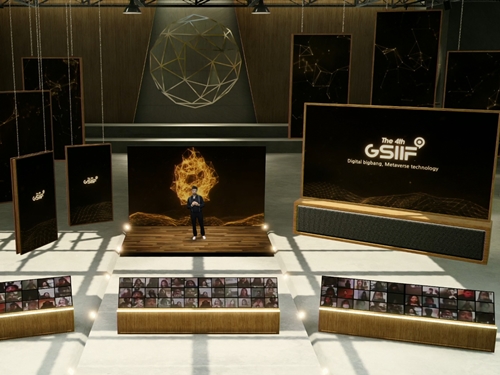 Digital Big Bang, Metaverse Technologies
The GSI Forum 2021 will explore the potential of new metaverse technologies that will change our daily lives
KAIST will be hosting a live online international forum on Sept.8 at 9 am (KST) through its KAIST YouTube channel. The forum will explore global trends regarding metaverse technology innovations and applications and discuss how we can build a new technology ecosystem.
Titled `Digital Big Bang, Metaverse Technology,' the Global Strategy Institute-International Forum 2021 will be the fourth event of its kind, following the three international forums held in 2020. The forum will delve into the development trends of metaverse platforms and AR/VR technologies and gather experts to discuss how such technologies could transform multiple aspects of our future, including education.
President Kwang Hyung Lee explains in his opening remarks that new technologies are truly opening a new horizon for our lives, saying, “In the education sector, digital technology will also create new opportunities to resolve the longstanding pedagogical shortfalls of one-way knowledge delivery systems. New digital technologies will help to unlock the creativity of our students. Education tailored to the students’ individual levels will not only help them accumulate knowledge but improve their ability to use it. Universities around the world are now at the same starting line. We should carve out our own distinct metaverse that is viable for human interactions and diverse technological experiences that promote students’ creativity and collaborative minds.”
Minster of Science and ICT Hyesook Lim will introduce how the Korean government is working to develop metaverse industries as a new potential engine of growth for the future in her welcoming remarks. The government’s efforts include collaborations with the private sector, investments in R&D, the development of talent, and regulatory reforms. Minister Lim will also emphasize the importance of national-level discussions regarding the establishment of a metaverse ecosystem and long-term value creation.
The organizers have invited global experts to share their knowledge and insights.
Kidong Bae, who is in charge of the KT Enterprise Project and ‘Metaverse One Team’ will talk about the current trends in the metaverse market and their implications, as well as KT’s XR technology references. He will also introduce strategies to establish and utilize a metaverse ecosystem, and highlight their new technologies as a global leader in 5G networks.
Jinha Lee, co-founder and CPO of the American AR solution company Spatial, will showcase a remote collaboration office that utilizes AR technology as a potential solution for collaborative activities in the post-COVID-19 era, where remote working is the ‘new normal.’ Furthermore, Lee will discuss how future workplaces that are not limited by space or distance will affect our values and creativity.
Professor Frank Steinicke from the University of Hamburg will present the ideal form of next-generation immersive technology that combines intelligent virtual agents, mixed reality, and IoT, and discuss his predictions for how the future of metaverse technology will be affected.
Marco Tempest, a creative technologist at NASA and a Director’s Fellow at the MIT Media Lab, will also be joining the forum as a plenary speaker. Tempest will discuss the potential of immersive technology in media, marketing, and entertainment, and will propose a future direction for immersive technology to enable the sharing of experiences, emotions, and knowledge.
Other speakers include Beomjoo Kim from Unity Technologies Korea, Professor Woontaek Woo from the Graduate School of Culture Technology at KAIST, Vice President of Global Sales at Labster Joseph Ferraro, and CEO of 3DBear Jussi Kajala. They will make presentations on metaverse technology applications for future education.
The keynote session will also have an online panel consisting of 50 domestic and overseas metaverse specialists, scientists, and teachers. The forum will hold a Q&A and discussion session where the panel members can ask questions to the keynote speakers regarding the prospects of metaverse and immersive technologies for education.
GSI Director Hoon Sohn stated, "KAIST will seize new opportunities that will arise in a future centered around metaverse technology and will be at the forefront to take advantage of the growing demand for innovative science and technology in non-contact societies. KAIST will also play a pivotal role in facilitating global cooperation, which will be vital to establish a metaverse ecosystem.”
2021.09.07 View 10132
Digital Big Bang, Metaverse Technologies
The GSI Forum 2021 will explore the potential of new metaverse technologies that will change our daily lives
KAIST will be hosting a live online international forum on Sept.8 at 9 am (KST) through its KAIST YouTube channel. The forum will explore global trends regarding metaverse technology innovations and applications and discuss how we can build a new technology ecosystem.
Titled `Digital Big Bang, Metaverse Technology,' the Global Strategy Institute-International Forum 2021 will be the fourth event of its kind, following the three international forums held in 2020. The forum will delve into the development trends of metaverse platforms and AR/VR technologies and gather experts to discuss how such technologies could transform multiple aspects of our future, including education.
President Kwang Hyung Lee explains in his opening remarks that new technologies are truly opening a new horizon for our lives, saying, “In the education sector, digital technology will also create new opportunities to resolve the longstanding pedagogical shortfalls of one-way knowledge delivery systems. New digital technologies will help to unlock the creativity of our students. Education tailored to the students’ individual levels will not only help them accumulate knowledge but improve their ability to use it. Universities around the world are now at the same starting line. We should carve out our own distinct metaverse that is viable for human interactions and diverse technological experiences that promote students’ creativity and collaborative minds.”
Minster of Science and ICT Hyesook Lim will introduce how the Korean government is working to develop metaverse industries as a new potential engine of growth for the future in her welcoming remarks. The government’s efforts include collaborations with the private sector, investments in R&D, the development of talent, and regulatory reforms. Minister Lim will also emphasize the importance of national-level discussions regarding the establishment of a metaverse ecosystem and long-term value creation.
The organizers have invited global experts to share their knowledge and insights.
Kidong Bae, who is in charge of the KT Enterprise Project and ‘Metaverse One Team’ will talk about the current trends in the metaverse market and their implications, as well as KT’s XR technology references. He will also introduce strategies to establish and utilize a metaverse ecosystem, and highlight their new technologies as a global leader in 5G networks.
Jinha Lee, co-founder and CPO of the American AR solution company Spatial, will showcase a remote collaboration office that utilizes AR technology as a potential solution for collaborative activities in the post-COVID-19 era, where remote working is the ‘new normal.’ Furthermore, Lee will discuss how future workplaces that are not limited by space or distance will affect our values and creativity.
Professor Frank Steinicke from the University of Hamburg will present the ideal form of next-generation immersive technology that combines intelligent virtual agents, mixed reality, and IoT, and discuss his predictions for how the future of metaverse technology will be affected.
Marco Tempest, a creative technologist at NASA and a Director’s Fellow at the MIT Media Lab, will also be joining the forum as a plenary speaker. Tempest will discuss the potential of immersive technology in media, marketing, and entertainment, and will propose a future direction for immersive technology to enable the sharing of experiences, emotions, and knowledge.
Other speakers include Beomjoo Kim from Unity Technologies Korea, Professor Woontaek Woo from the Graduate School of Culture Technology at KAIST, Vice President of Global Sales at Labster Joseph Ferraro, and CEO of 3DBear Jussi Kajala. They will make presentations on metaverse technology applications for future education.
The keynote session will also have an online panel consisting of 50 domestic and overseas metaverse specialists, scientists, and teachers. The forum will hold a Q&A and discussion session where the panel members can ask questions to the keynote speakers regarding the prospects of metaverse and immersive technologies for education.
GSI Director Hoon Sohn stated, "KAIST will seize new opportunities that will arise in a future centered around metaverse technology and will be at the forefront to take advantage of the growing demand for innovative science and technology in non-contact societies. KAIST will also play a pivotal role in facilitating global cooperation, which will be vital to establish a metaverse ecosystem.”
2021.09.07 View 10132 -
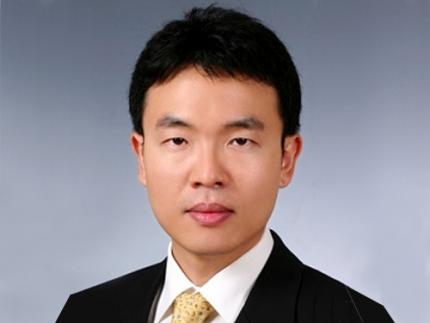 Prof. Junil Choi Receives the Neal Shepherd Memorial Award
Professor Junil Choi of the School of Electrical Engineering received the 2021 Neal Shepherd Memorial Award from the IEEE Vehicular Technology Society. The award recognizes the most outstanding paper relating to radio propagation published in major journals over the previous five years.
Professor Cho, the recipient of the 2015 IEEE Signal Processing Society’s and the 2019 IEEE Communications Society’s Best Paper Award, was selected as the awardee for his paper titled “The Impact of Beamwidth on Temporal Channel Variation in Vehicular Channels and Its Implications” in IEEE Transaction on Vehicular Technology in 2017.
In this paper, Professor Choi and his team derived the channel coherence time for a wireless channel as a function of the beamwidth, taking both Doppler effect and pointing error into consideration. The results showed that a nonzero optimal beamwidth exists that maximizes the channel coherence time. To reduce the impact of the overhead of doing realignment in every channel coherence time, the paper showed that the beams should be realigned every beam coherence time for the best performance.
Professor Choi said, “It is quite an honor to receive this prestigious award following Professor Joonhyun Kang who won the IEEE VTS’s Jack Neubauer Memorial Award this year. It shows that our university’s pursuit of excellence in advanced research is being well recognized.”
2021.07.26 View 7766
Prof. Junil Choi Receives the Neal Shepherd Memorial Award
Professor Junil Choi of the School of Electrical Engineering received the 2021 Neal Shepherd Memorial Award from the IEEE Vehicular Technology Society. The award recognizes the most outstanding paper relating to radio propagation published in major journals over the previous five years.
Professor Cho, the recipient of the 2015 IEEE Signal Processing Society’s and the 2019 IEEE Communications Society’s Best Paper Award, was selected as the awardee for his paper titled “The Impact of Beamwidth on Temporal Channel Variation in Vehicular Channels and Its Implications” in IEEE Transaction on Vehicular Technology in 2017.
In this paper, Professor Choi and his team derived the channel coherence time for a wireless channel as a function of the beamwidth, taking both Doppler effect and pointing error into consideration. The results showed that a nonzero optimal beamwidth exists that maximizes the channel coherence time. To reduce the impact of the overhead of doing realignment in every channel coherence time, the paper showed that the beams should be realigned every beam coherence time for the best performance.
Professor Choi said, “It is quite an honor to receive this prestigious award following Professor Joonhyun Kang who won the IEEE VTS’s Jack Neubauer Memorial Award this year. It shows that our university’s pursuit of excellence in advanced research is being well recognized.”
2021.07.26 View 7766 -
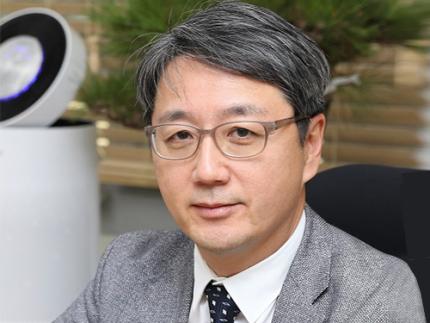 Professor Kang’s Team Receives the IEEE Jack Newbauer Memorial Award
Professor Joonhyuk Kang of the School of Electrical Engineering received the IEEE Vehicular Technology Society’s 2021 Jack Neubauer Memorial Award for his team’s paper published in IEEE Transactions on Vehicular Technology. The Jack Neubauer Memorial Award recognizes the best paper published in the IEEE Transactions on Vehicular Technology journal in the last five years.
The team of authors, Professor Kang, Professor Sung-Ah Chung at Kyungpook National University, and Professor Osvaldo Simeone of King's College London reported their research titled Mobile Edge Computing via a UAV-Mounted Cloudlet: Optimization of Bit Allocation and Path Planning in IEEE Transactions on Vehicular Technology, Vol. 67, No. 3, pp. 2049-2063, in March 2018.
Their paper shows how the trajectory of aircraft is optimized and resources are allocated when unmanned aerial vehicles perform edge computing to help mobile device calculations. This paper has currently recorded nearly 400 citations (based on Google Scholar). "We are very happy to see the results of proposing edge computing using unmanned aerial vehicles by applying optimization theory, and conducting research on trajectory and resource utilization of unmanned aerial vehicles that minimize power consumption," said Professor Kang.
2021.07.12 View 9111
Professor Kang’s Team Receives the IEEE Jack Newbauer Memorial Award
Professor Joonhyuk Kang of the School of Electrical Engineering received the IEEE Vehicular Technology Society’s 2021 Jack Neubauer Memorial Award for his team’s paper published in IEEE Transactions on Vehicular Technology. The Jack Neubauer Memorial Award recognizes the best paper published in the IEEE Transactions on Vehicular Technology journal in the last five years.
The team of authors, Professor Kang, Professor Sung-Ah Chung at Kyungpook National University, and Professor Osvaldo Simeone of King's College London reported their research titled Mobile Edge Computing via a UAV-Mounted Cloudlet: Optimization of Bit Allocation and Path Planning in IEEE Transactions on Vehicular Technology, Vol. 67, No. 3, pp. 2049-2063, in March 2018.
Their paper shows how the trajectory of aircraft is optimized and resources are allocated when unmanned aerial vehicles perform edge computing to help mobile device calculations. This paper has currently recorded nearly 400 citations (based on Google Scholar). "We are very happy to see the results of proposing edge computing using unmanned aerial vehicles by applying optimization theory, and conducting research on trajectory and resource utilization of unmanned aerial vehicles that minimize power consumption," said Professor Kang.
2021.07.12 View 9111 -
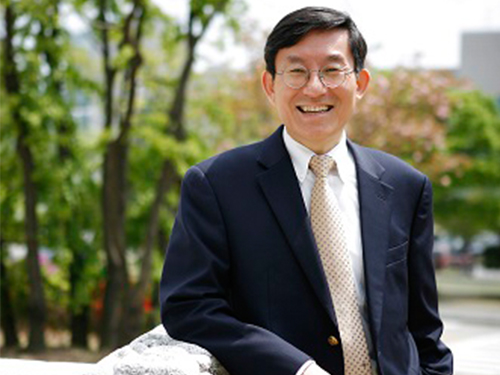 Professor Yim Appointed As Associate Editor of Nuclear Technology
Professor Man-Sung Yim from the Department of Nuclear and Quantum Engineering was appointed as the associate editor (for the Asian region) of Nuclear Technology ― a leading international research journal of the American Nuclear Society. Professor Yim will serve his term for three years from May 2019.
The American Nuclear Society, established in 1954, is comprised of more than 11,000 global members and aims to advance nuclear science, engineering, and technology while supporting the peaceful and beneficial applications of nuclear energy. Since its first publication in 1971, Nuclear Technology has been a representative journal of the society, reporting state-of-the-art information on all phases of the practical applications of nuclear technology.
Professor Yim is being recognized worldwide for his pioneering nuclear education, research, and policy studies in the fields of non-proliferation, safeguards for severe accident management, and waste management. He served as the head professor of the Department of Nuclear and Quantum Engineering and established the Nonproliferation Education and Research Center (NEREC) at KAIST.
Professor Yim remarked, “Asia has an important role to play at the forefront of the world’s nuclear research considering that nuclear development is most actively being carried out in the Asian region these days.”
2019.05.17 View 8890
Professor Yim Appointed As Associate Editor of Nuclear Technology
Professor Man-Sung Yim from the Department of Nuclear and Quantum Engineering was appointed as the associate editor (for the Asian region) of Nuclear Technology ― a leading international research journal of the American Nuclear Society. Professor Yim will serve his term for three years from May 2019.
The American Nuclear Society, established in 1954, is comprised of more than 11,000 global members and aims to advance nuclear science, engineering, and technology while supporting the peaceful and beneficial applications of nuclear energy. Since its first publication in 1971, Nuclear Technology has been a representative journal of the society, reporting state-of-the-art information on all phases of the practical applications of nuclear technology.
Professor Yim is being recognized worldwide for his pioneering nuclear education, research, and policy studies in the fields of non-proliferation, safeguards for severe accident management, and waste management. He served as the head professor of the Department of Nuclear and Quantum Engineering and established the Nonproliferation Education and Research Center (NEREC) at KAIST.
Professor Yim remarked, “Asia has an important role to play at the forefront of the world’s nuclear research considering that nuclear development is most actively being carried out in the Asian region these days.”
2019.05.17 View 8890 -
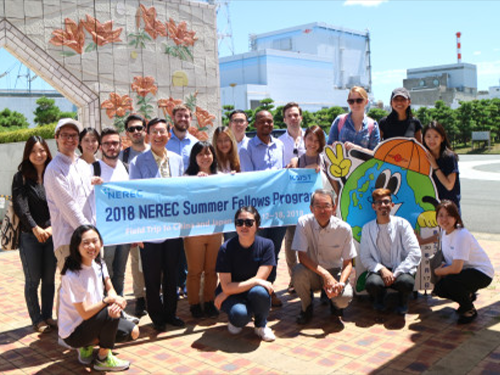 NEREC Summer Program Keeps Fellows Thinking, Engaged in Nuclear Nonproliferation
Nuclear technology is more than just technology. It is the fruit of the most advanced science and technology. It also requires high standards of policymaking and global cooperation for benefiting the technology.
As part of the fifth annual Nuclear Nonproliferation Education and Research Center (NEREC) Summer Fellows Program at KAIST, 24 students from 15 countries participated in six-week intensive education and training program. NEREC is the only university-based center dedicated to nuclear nonproliferation education and research established in 2014.
The program, which provides multidisciplinary lectures and seminars on nuclear technology and policy as well as international relations, was designed to nurture global nuclear technology experts well equipped in three areas: in-depth knowledge of technology, applicability gained from sound policy building, and negotiating for international cooperation. It now has grown into the most popular summer program at KAIST.
During the program from July 6 to August 18, participants were able to engage in enriching and stimulating learning experiences in tandem with policies and technology for the utilization and provision of peaceful and safe nuclear technology.
Participating fellows also had to conduct a group research project on a given topic. This year, they explored nuclear nonproliferation issues in relation to nuclear exports and brainstormed some recommendations for current policy. They presented their outcomes at the 2018 NEREC Conference on Nuclear Nonproliferation. After intensive lecture sessions and group research work, the fellows went off to key policy think-tanks, nuclear research institutes, and research power facilities in Korea, Japan, and China.
“NEREC emphasizes nuclear nonproliferation issues related to civilian nuclear power and the associated nuclear fuel cycle development from the point of technology users. I am very glad that the number of participants are increasing year by year,” said the Director of NEREC Man-Sung Yim, a professor in the Department of Nuclear and Quantum Engineering.
Participants’ majors vary from nuclear engineering to international relations to economics. The fellows divided into two groups of graduate and undergraduate courses. They expressed their deep satisfactory in the multidisciplinary lectures by scholars from KAIST, Seoul National University, and Korea National Defense University.
Many participants reported that they learned a lot, not only about policy and international relations but on the research they are conducting and what the key issues will be in dealing for producing meaningful research work.
Moad Aldbissi from the KTH Royal Institute of Technology is one of the students who shared the same view. He said, “Coming from a technical background in nuclear engineering, I managed to learn a lot about nuclear policy and international relations. The importance of integrating the technical and political fields became even clearer.”
Most students concurred that they recognized how important it was to make international collaboration in this powerful field for each country through this program.
“As an engineering student, I just approached this program like an empty glass in policy areas. While working with colleagues during the program, I came to understand how important it is to make cooperation in these fields for the better result of national development and international relations,” said Thanataon Pornphatdetaudom from the Tokyo Institute of Technology.
To Director Yim, this program is becoming well positioned to educate nuclear policy experts in a number of countries of strategic importance. He believes the continuous supply of these experts will contribute to promoting global nuclear nonproliferation and the peaceful use of nuclear energy while the use of nuclear technology continues.
2018.09.04 View 12245
NEREC Summer Program Keeps Fellows Thinking, Engaged in Nuclear Nonproliferation
Nuclear technology is more than just technology. It is the fruit of the most advanced science and technology. It also requires high standards of policymaking and global cooperation for benefiting the technology.
As part of the fifth annual Nuclear Nonproliferation Education and Research Center (NEREC) Summer Fellows Program at KAIST, 24 students from 15 countries participated in six-week intensive education and training program. NEREC is the only university-based center dedicated to nuclear nonproliferation education and research established in 2014.
The program, which provides multidisciplinary lectures and seminars on nuclear technology and policy as well as international relations, was designed to nurture global nuclear technology experts well equipped in three areas: in-depth knowledge of technology, applicability gained from sound policy building, and negotiating for international cooperation. It now has grown into the most popular summer program at KAIST.
During the program from July 6 to August 18, participants were able to engage in enriching and stimulating learning experiences in tandem with policies and technology for the utilization and provision of peaceful and safe nuclear technology.
Participating fellows also had to conduct a group research project on a given topic. This year, they explored nuclear nonproliferation issues in relation to nuclear exports and brainstormed some recommendations for current policy. They presented their outcomes at the 2018 NEREC Conference on Nuclear Nonproliferation. After intensive lecture sessions and group research work, the fellows went off to key policy think-tanks, nuclear research institutes, and research power facilities in Korea, Japan, and China.
“NEREC emphasizes nuclear nonproliferation issues related to civilian nuclear power and the associated nuclear fuel cycle development from the point of technology users. I am very glad that the number of participants are increasing year by year,” said the Director of NEREC Man-Sung Yim, a professor in the Department of Nuclear and Quantum Engineering.
Participants’ majors vary from nuclear engineering to international relations to economics. The fellows divided into two groups of graduate and undergraduate courses. They expressed their deep satisfactory in the multidisciplinary lectures by scholars from KAIST, Seoul National University, and Korea National Defense University.
Many participants reported that they learned a lot, not only about policy and international relations but on the research they are conducting and what the key issues will be in dealing for producing meaningful research work.
Moad Aldbissi from the KTH Royal Institute of Technology is one of the students who shared the same view. He said, “Coming from a technical background in nuclear engineering, I managed to learn a lot about nuclear policy and international relations. The importance of integrating the technical and political fields became even clearer.”
Most students concurred that they recognized how important it was to make international collaboration in this powerful field for each country through this program.
“As an engineering student, I just approached this program like an empty glass in policy areas. While working with colleagues during the program, I came to understand how important it is to make cooperation in these fields for the better result of national development and international relations,” said Thanataon Pornphatdetaudom from the Tokyo Institute of Technology.
To Director Yim, this program is becoming well positioned to educate nuclear policy experts in a number of countries of strategic importance. He believes the continuous supply of these experts will contribute to promoting global nuclear nonproliferation and the peaceful use of nuclear energy while the use of nuclear technology continues.
2018.09.04 View 12245